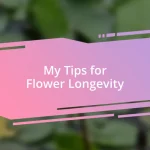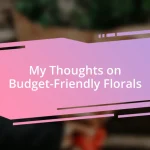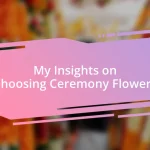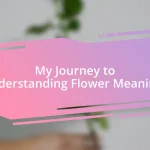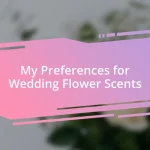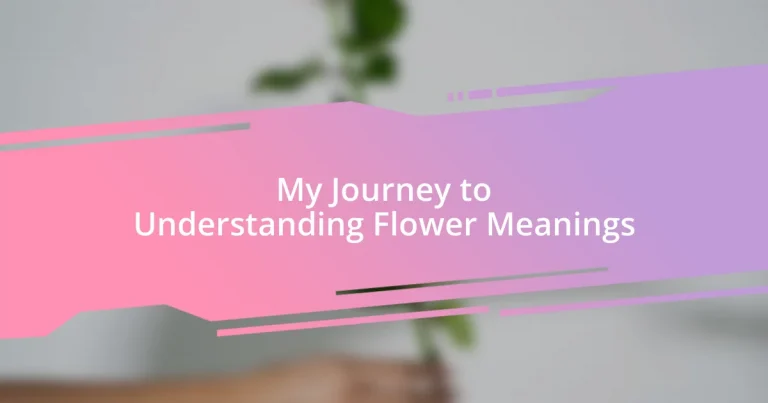Key takeaways:
- Flowers hold deep meanings, enhancing emotional communication and connections through their symbolism.
- Understanding flower meanings allows for thoughtful gifting, reflecting the recipient’s emotions and preferences.
- Engaging with flowers through research, personal experiences, and cultural exploration can expand knowledge and appreciation of their significance.
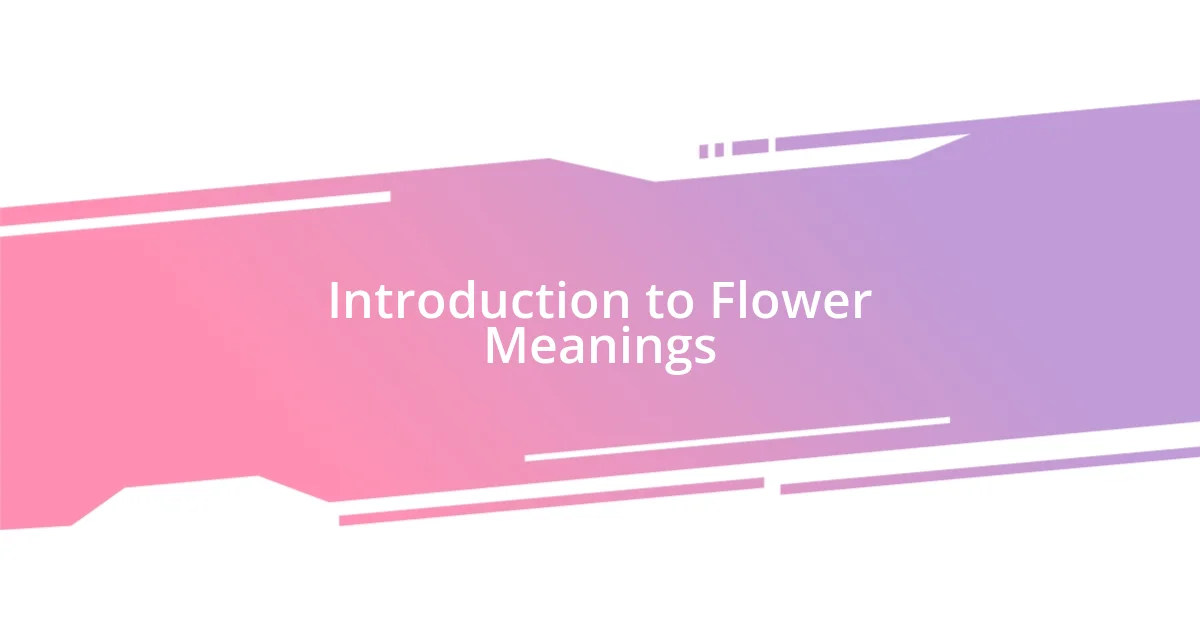
Introduction to Flower Meanings
When I first stumbled upon the idea that flowers carry deeper meanings, I felt a spark of intrigue. It’s fascinating to think about how a simple bloom can convey love, sympathy, or even friendship. This revelation changed how I viewed the flowers in my garden; each petal seemed to tell a story or express a feeling.
Have you ever received flowers and wondered why those specific blooms were chosen? Each flower has a history and symbolism that can transform a bouquet into a heartfelt message. For instance, the delicate beauty of a rose typically symbolizes love, but did you know that its color can change the message entirely? A red rose speaks of romance, while a white one conveys innocence and new beginnings.
As I reflect on this, I can’t help but recall the day I chose a yellow sunflower for a friend’s birthday. I knew it represented joy and warmth, and seeing her smile was a powerful reminder that flowers are more than just decorations; they’re a language of their own. Understanding flower meanings enhances our relationships and can deepen the emotional connections we share.
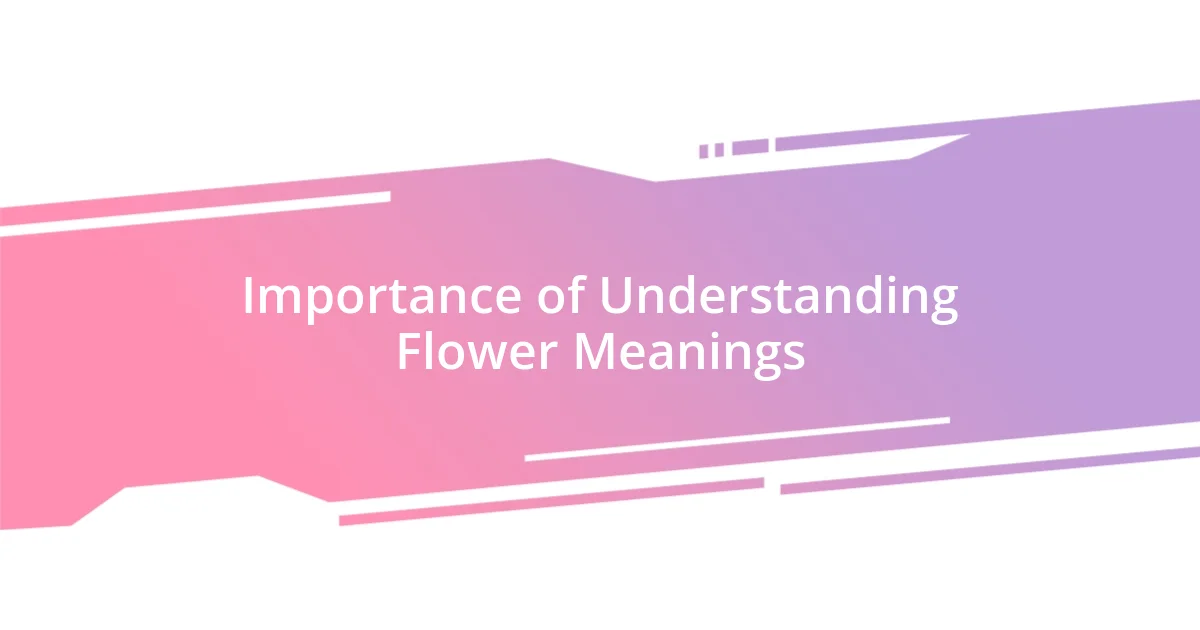
Importance of Understanding Flower Meanings
Understanding flower meanings is crucial because it allows us to communicate emotions more effectively. When I selected a bouquet for my mom’s birthday, I knew she adored lilacs, which symbolize love and happiness. The act of choosing those flowers felt like wrapping her in a warm embrace, conveying sentiments that words sometimes fail to express.
Here are some reasons why grasping flower meanings is so important:
- Enhanced Communication: Flowers can articulate feelings that might be difficult to express verbally.
- Thoughtful Gifting: Choosing specific blooms shows consideration and an understanding of the recipient’s preferences or emotions.
- Cultural Significance: Different cultures attribute various meanings to flowers, enriching our understanding and appreciation of traditions.
By connecting deeper with flower meanings, we craft narratives that resonate with those we care about. Each bloom becomes a part of our shared experiences, enriching our interactions.
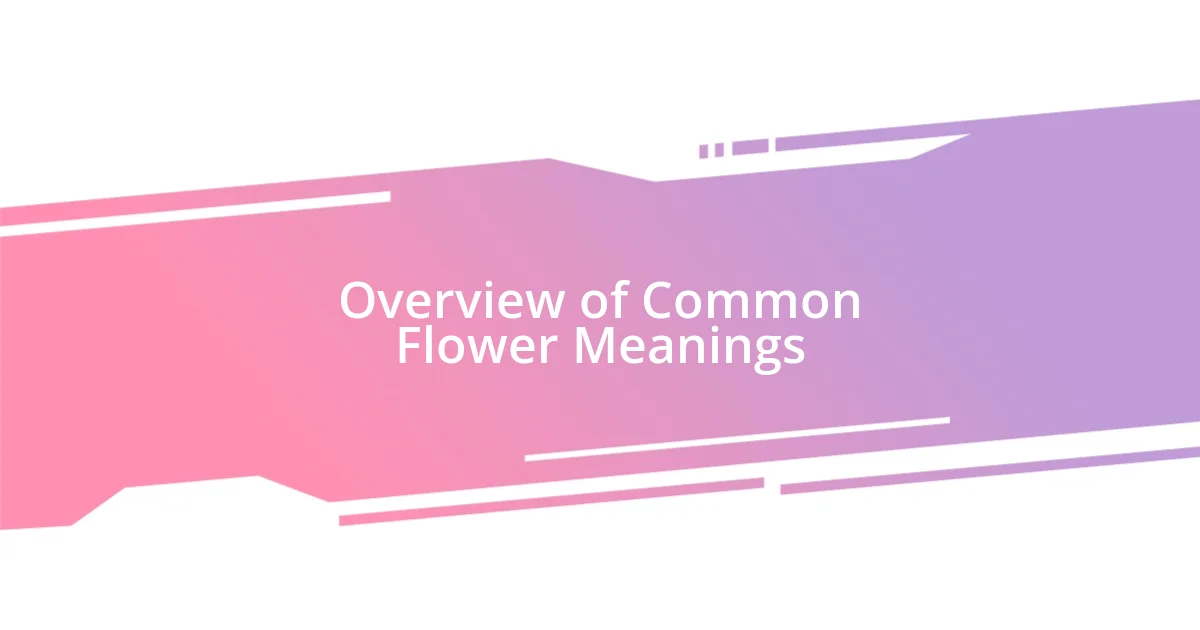
Overview of Common Flower Meanings
Understanding the meaning behind different flowers can truly transform the way we perceive them. For example, I remember gifting a friend a beautiful bouquet of daisies. To me, it was about friendship and purity—a perfect representation of our bond. It’s incredible how much thought can go into a simple arrangement when we know the meanings behind each bloom.
Then there are flowers like the lavender, which not only look lovely but also carry a sense of calmness and tranquility. I’ve often used lavender in my home as a reminder to embrace peaceful moments, especially during stressful times. Each flower’s symbolism isn’t just a pleasant detail; it becomes a part of our lives, shaping how we experience emotions daily.
When we look at flowers collectively, their meanings can provide rich insights into love, friendship, and even remembrance. I often think back to a time when I laid out a selection for a memorial service, choosing chrysanthemums for their representation of honor and loyalty. Those choices reflect how flowers can poignantly express our feelings at significant life moments.
| Flower | Meaning |
|---|---|
| Rose | Love and Passion |
| Lilac | Joy and Love |
| Sunflower | Adoration and Loyalty |
| Daisy | Innocence and Friendship |
| Lavender | Calmness and Tranquility |
| Chrysanthemum | Honor and Loyalty |
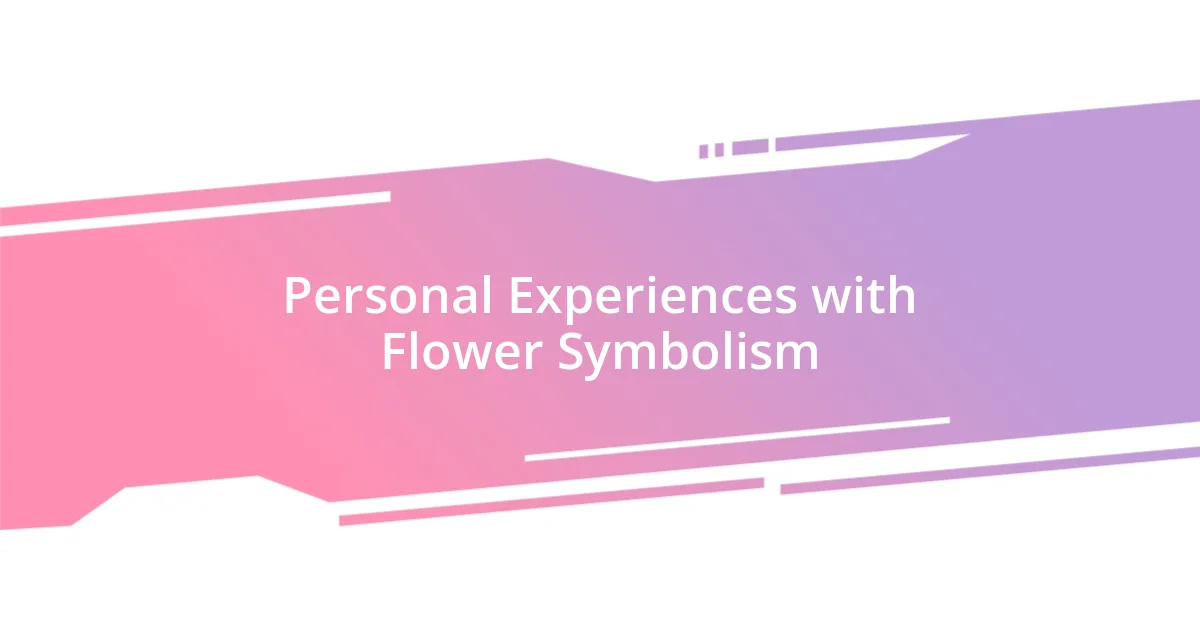
Personal Experiences with Flower Symbolism
One memorable experience I had was when I decided to plant a garden filled with forget-me-nots. I chose these delicate blooms specifically because they symbolize true love and memories. Each time I tend to them, I can’t help but feel a sense of connection to my late grandmother. It’s as if those flowers are rooted in our shared legacy, whispering reminders of her wisdom and warmth.
I also recall a time when I received a bouquet of peonies unexpectedly. Their lush petals and lush fragrance spoke to me about romance and prosperity. It was such a delightful surprise that I found myself daydreaming of the person who might have chosen them with love—an immediate feeling of joy washed over me. Isn’t it fascinating how a simple act, like gifting flowers, can evoke such profound emotions?
Another significant moment happened during a friend’s wedding, where the bride carried a bouquet of red roses, symbolizing passionate love. Watching her walk down the aisle, surrounded by the vibrant blooms, made me appreciate how flowers can encapsulate a moment in time. The roses weren’t just beautiful; they represented the dreams and aspirations of a new beginning, showcasing the rich tapestry of human emotions interwoven with the language of flowers.
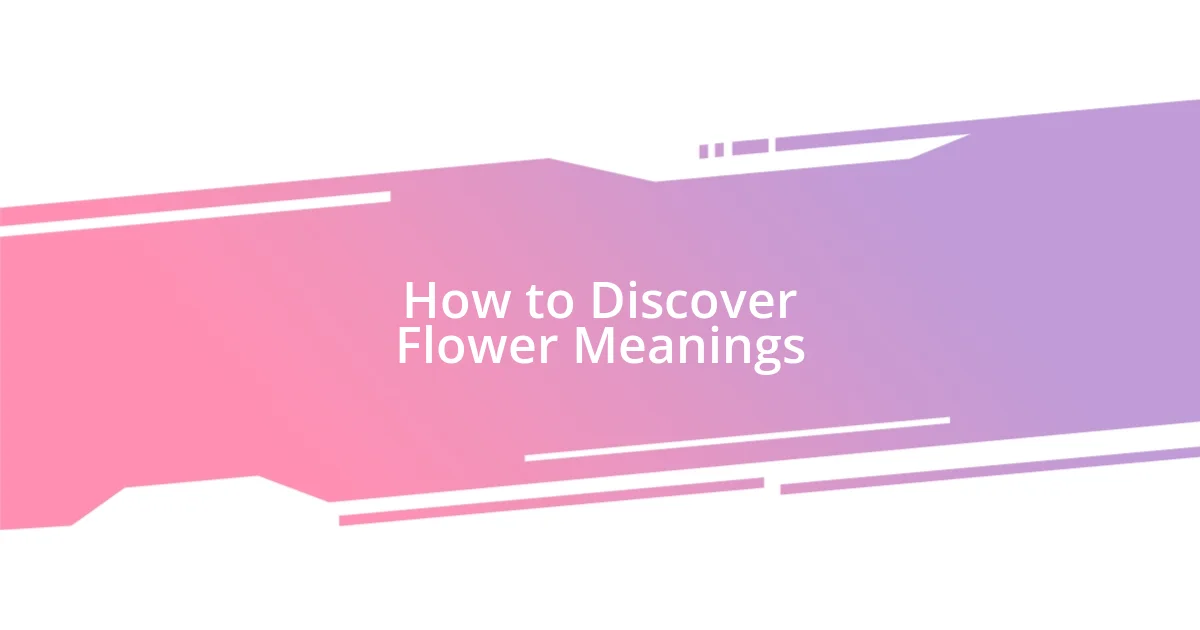
How to Discover Flower Meanings
To truly discover flower meanings, I suggest starting with a little research. I’ve spent evenings flipping through flower dictionaries and online resources, immersing myself in the rich history and symbolism behind various blooms. It’s surprising how many stories and emotions are tied to each flower, and that exploration deepens my appreciation for them.
One day, while visiting a local flower shop, I made it a point to ask the florist about the meanings of the flowers displayed. As she enthusiastically shared insights about each arrangement, from the uplifting spirit of sunflowers to the quiet strength of irises, I felt a sense of connection not just to the flowers, but to the emotions they could convey. Have you ever had a conversation that left you craving more knowledge? That’s how I felt, eager to weave these meanings into my own life and gifts.
A practical approach is to engage with nature directly. As I walk through parks or gardens, I take the time to notice the blooms around me, reflecting on what they might represent. This practice has transformed mundane strolls into enlightening experiences. I even began a small journal to jot down my thoughts and discoveries, something I believe you might find quite satisfying. What if you tried this too? You’ll likely find that each flower has its own unique story waiting to unfold.
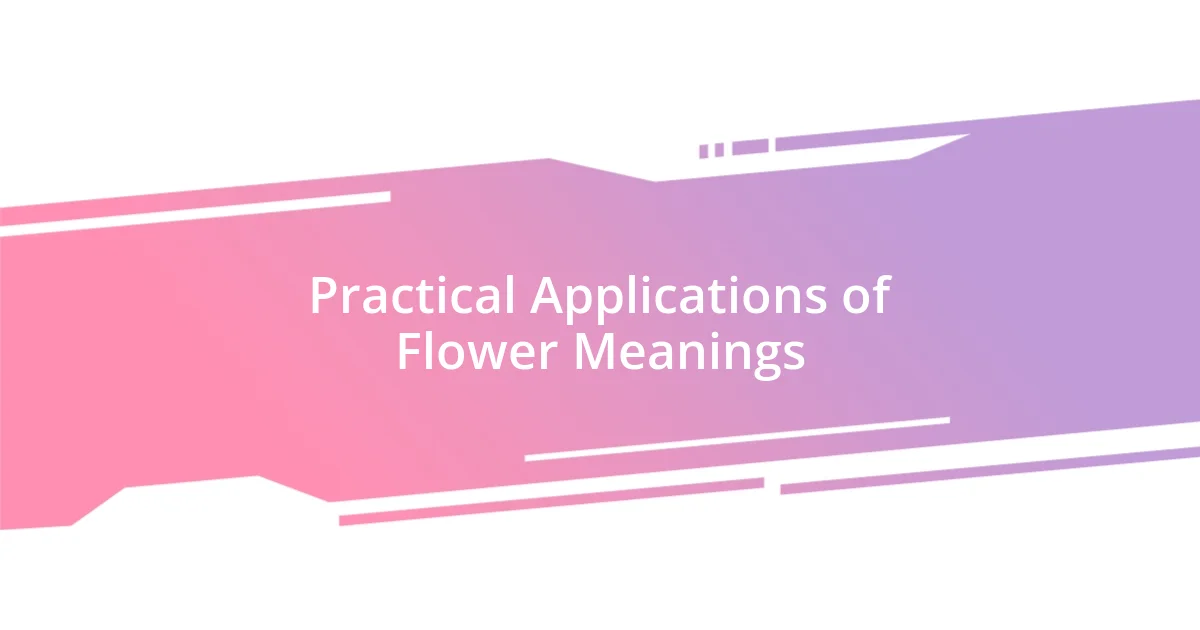
Practical Applications of Flower Meanings
While exploring the practical applications of flower meanings, I’ve found they can significantly enhance our personal interactions. For instance, I once decided to give a colleague a small plant of lavender when she secured a big promotion, knowing it symbolized devotion and tranquility. The smile on her face was priceless, and in that moment, I realized how impactful a thoughtful gift can be. Have you ever experienced how the right flower can strengthen a bond?
Flowers also play an essential role in life’s milestones. After attending a friend’s graduation, I gave her a bouquet of daisies, which represent new beginnings and innocence. I remember her gleeful reaction and how we both felt a surge of hope for the future. It struck me then that the flowers we choose for life’s events often embody the feelings we struggle to express in words. Isn’t it beautiful how a simple bouquet can convey so much?
Using flower meanings extends beyond gifting; it can enrich our self-care practices as well. I began incorporating flowers into my meditation space, using blooms that resonate with positivity like sunflowers. Each time I sit down to relax, gazing at those bright petals instantly lifts my spirit. Have you considered how a specific flower could enhance your environment and emotional well-being? Cultivating that awareness has transformed my routine into a more reflective experience.
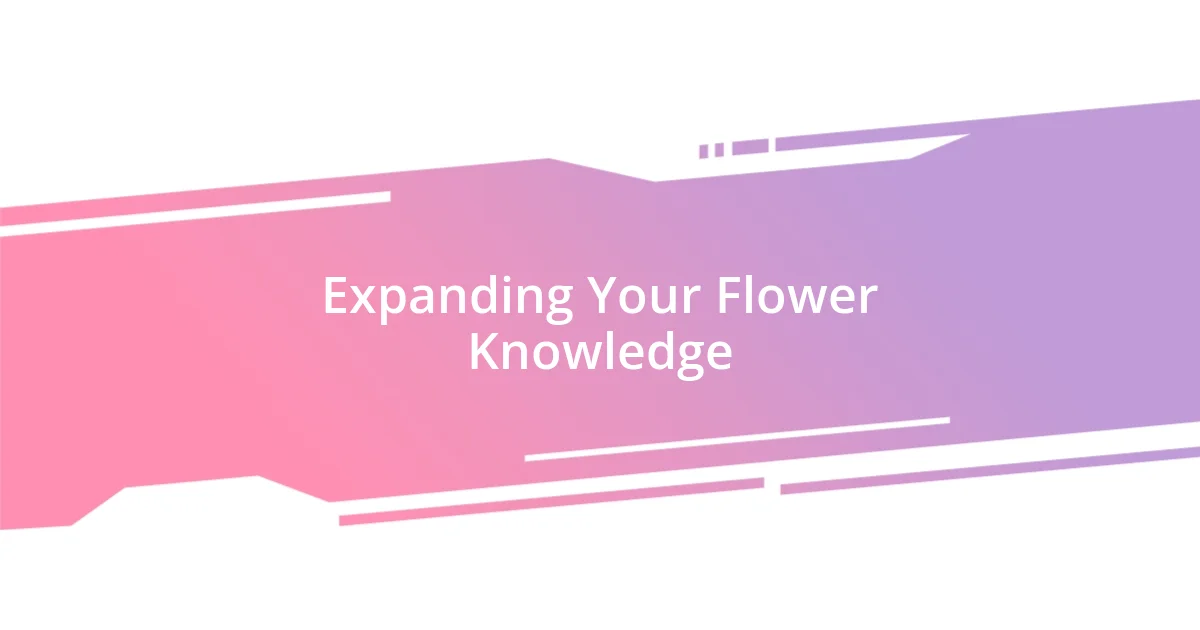
Expanding Your Flower Knowledge
As I dove deeper into the world of flowers, I stumbled upon wonderful resources like botanical gardens and flower shows. During my visit to a local flower festival, I couldn’t help but chat with enthusiasts who shared their favorite flower meanings and personal stories. I realized that every bloom holds a special connection for someone, enriching my knowledge and expanding my perspective. Have you ever felt that spark of curiosity in such places?
Another delightful way to expand my flower knowledge is by exploring cultural interpretations. For instance, learning about the Japanese tradition of Hanami, which celebrates cherry blossoms, illuminated the deep meaning of fleeting beauty. Reflecting on how different cultures perceive flowers has taught me that meanings are not just personal; they are woven into the fabric of society. Have you considered how a flower’s significance might change across cultures?
Finally, I started attending workshops and classes focused on floristry and flower arranging. Engaging with experts and fellow flower lovers created a strong sense of community, which only fueled my passion. The process of creating floral arrangements, paired with the meanings behind each flower, has added a layer of joy to my understanding. Could immersing yourself in such events ignite new interests and connections for you?




